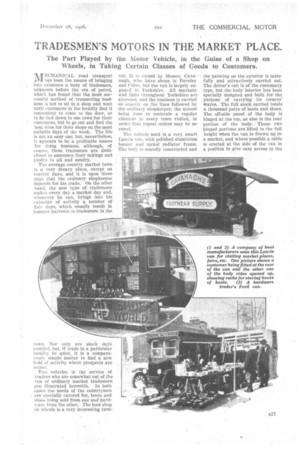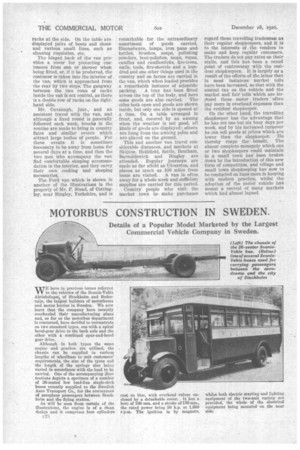TRADESMEN'S MOTORS IN THE MARKET PLACE.
Page 45

Page 46

If you've noticed an error in this article please click here to report it so we can fix it.
The Part Played by the Motor Vehicle, in the Guise of a Shop on Wheels, in Taking Certain Classes of Goods to Customers.
MECHANICAL road transport has been the means of bringing into existence a body of tradesmen, unknown before the era of petrol, which has found that the most successful method of transacting business is not to sit in a shop and wait until customers in the locality find it convenient to come to the door, or to be tied down to one town for their customers, but to go out and find the best sites for their shops on the most suitable days of the week. The life is not an easy one, but, nevertheless, it appears to be a profitable means for doing business, although, or course, these tradesmen are disinclined to announce their takings and profits to all and sundry.
The average country market town is a very dreary place, . except on market days, and it is upon these days that the ordinary shopkeeper depends for his trade. On the other hand, the new type of trades-man makes every day a market day and, whenever he can, brings into his calendar of activity a number of fair days, which usually result in bumper harvests to tradesmen in the
town. Not only are slack days . avoided, but, if trade in a particular locality be quiet, it is a comparatively simple matter to find a new flAil of activity where prospects are better.
Two vehicles .in the service Of traders who are somewhat out of the run of ordinary market tradesmen are illustrated herewith. In .,both cases the needs of the countrymen • are specially catered for, beets and shoes being sold from one and' hardware from the other. The boot shop on wheels is a very interesting turn. Out. It is owned by Messrs. Cavanagh, who have shops in Burnley and Colne, but the van is largely engaged in Yorkshire. All markets and fairs throughout Yorkshire are attended. and the business is carried on exactly on the lines followed by the ordinary shopkeeper, the utmost being done to maintain a regular clientele in every town visited, in order that repeat orders may be secured_
The vehicle used is a very smart Lancia van, with polished aluminium bonnet and nickel radiator frame. The holly is soundly constructed and
the painting on the exterior is tastefully and attractively carried out. The driver's cab is of the customary type, but the body interior has been specially designed and built for the purpose of carrying its owners' 'wares. The full stock carried totals a thousand pairs of boots and shoes. The off-side panel of the body is hinged at the top, as also is the rear portion of the body. These two hinged portions are lifted to the full height when the van is drawn up in a market, and where possible a table is erected at the side of the van in a position to give easy access to the
racks at the side. On the table are displayed pairs of boots and shoes and various small lines, such as cleaning requisites, etc.
The hinged back of the van provides a cover for protecting customers from sun or shower when being fitted, or, if it be preferred, the customer is taken into the interior of the van, which is approached from the rear by two steps. The gangway between the two rows of racks inside the van is not central, as there is a double row of racks on the righthand side.
Mr. Cavanagh, junr., and an assistant travel with the van, and although a fixed round is generally followed each week, breaks in the routine are made to bring in country fairs and similar events which attract large bodies of people. For these events it is sometimes necessary to be away from home for several days at a time, and then the two men who accompany the van find comfortable sleeping accommodation in the interior, and they carry their own cooking and sleeping necessaries.
The Ford van which is shown in another of the illustrations is the property of Mr. P. Stead, of Cottingley, near Bingley, Yorkshire, and is remarkable for the extraordinary assortment of goods carried. Enamelware, lamps, iron pans and kettles, brushes, soaps, polishing powders, boot-polishes, mops, ropes, candles and candlesticks, fire-irons, nails, tools, fire-shovels and a hundred and one other things used in the country and on farms are carried in the van, which when loaded provides a remarkable instance of scientific packing. A tray has been fitted across the top of the body, and here some goods are also carried. The sides both open and goods are shown inside, but only one side is opened at a time. On a table arranged in front, and, covered by an awning when the weather is not good, all kinds of goods are displayed; others are hung from the awning poles and are placed on the ground.
This and another van travel considerable distances, and markets at Skipton, Hellifield, Settle, Bentham, Barnoldswick and Bingley are attended. Regular journeys are made as far afield as Ulverston, and places as rauch as 100 miles from home are visited. A Van is often away for a whole week and sufficient supplies are carried for this period.
Country people who visit the market town to make purchases regard these travelling tradesmen as their regular shopkeepers, and it is to the interests of the vendors to make and keep regular customers. The traders do not pay rates on their stalls, and this has been a vexed point of controversy with the resident shopkeepers. It is largely as a result of the efforts of the latter that In most instances market tolls have been increased, so that with the annual tax on the vehicle and the market and fair tolls which are imtiosed these motor traders often pay more in overhead expenses than the resident shopkeeper.
On the other hand, the travelling shopkeeper has the advantage that he has not one but six busy days per week, and by his increased turnover he can sell goods at prices which are lower than the shopkeeper. He thereby reaps the benefit The almost complete monopoly. which one or two shopkeepers could maintain in a small town' has been broken down by the introduction of this new form of competition, and village and small town shopkeeping has now to be conducted on lines more in keeping with modern practice, whilst the adoption of the motor vehicle has meant a revival of many markets which had almost lapsed.




































































































